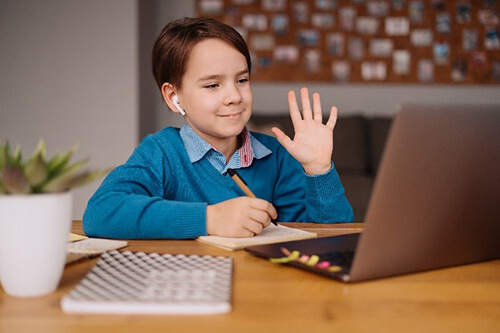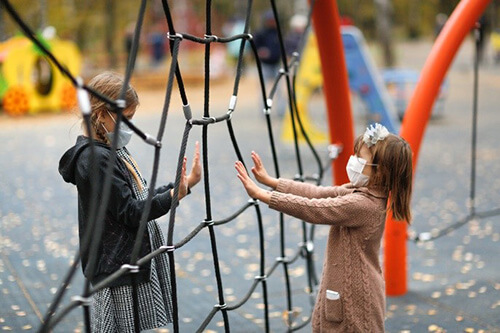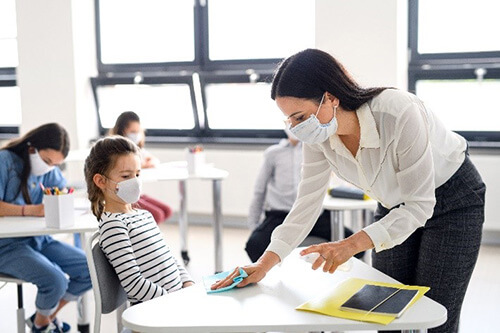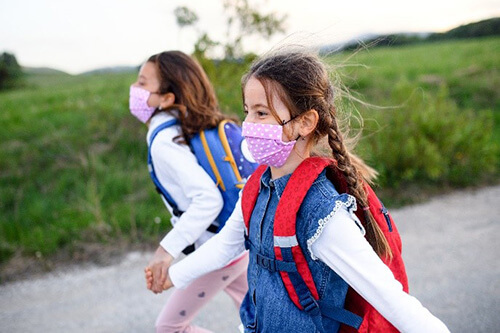March 2020:
All of us remember when the World Heath Organization declared Covid-19 a pandemic. Life came to a standstill as the largest national lockdown in the democratic world was imposed and the world as we knew it changed before our very eyes. We moved from physical offline work and studies to a digital, online mode. The transition (initially forced upon us) was not entirely smooth but soon enough everyone settled into it. Teachers led the crusade by example.

Since children could not come to school, they took the school to the children. 2 years and 3 official “waves” later, parents, teachers and children alike are pleased and relieved that some semblance of normalcy seems to be returning to our life. However, all of us know that it can be a little complicated to pick up the threads from where we left them 2 years ago- more so as the pandemic is still not over and many experts suggest that Covid and its variants might be here to stay.
June 2022:
As schools gear up for their new academic session, they must now balance the educational, social and emotional needs of their students. They must also ensure that the health and safety of both students and staff alike is taken care of. Having said that, it is not only the schools and teachers facing the pressure, reopening of schools is a stressful time for parents and children too. While all of us agree that returning to school is important because children need in-person learning and social interactions with their peers, this alone cannot ensure that the switch from online to offline classes will be seamless.

The youngest pre-schoolers and foundational stage learners will either be going to school for the first time or have only a faint recollection of how things work at school. The older students might be excited and eager to get back to face-to-face learning and see their teachers and friends, yet they may also feel anxious and unsure about catching up on learning and getting back to a tight school schedule.
Whether your child is excited or nervous about starting school, it is natural for parents to feel concerned too. Here are a few questions you can ask the school authorities to put your mind at ease.
YOU MAY CHECK WITH THE SCHOOL ABOUT:
- How will the classroom spaces be set up?
- What will happen during recess? Will children be playing together outside?
- What will be the status of sports and extra-curricular activities?
- How will the school manage face masks, hand hygiene, physical distancing, sanitizing etc.
- Will some kind of health screening be done every day?
- What is the policy if a child shows symptoms in school?
Once we are satisfied with the school’s preparedness, it is time to turn our attention to our children. There are certain safety guidelines that we must discuss with them. It is imperative that they understand that when it comes to Covid-19, we cannot afford to let our guard down.
PRECAUTIONS TO TAKE TO KEEP CHILDREN SAFE:

- If your child is in the age group eligible for vaccination, make sure they get both doses at the earliest.
- Remind your child to follow Covid-19 protocol at all times- wearing masks, keeping physical distance and maintaining good hand hygiene.
- Discuss with your child why it is important to follow all the rules in place at school in order to maintain their safety.
- Label your child’s mask clearly and always give spare masks to them in their bag. Advise them to change their mask if it gets sweaty/ dirty/ wet. Never should they trade or exchange masks with their friends or classmates.
- Emphasize the importance of frequent and thorough hand washing.
- Do not send your child to school if they feel sick. Look out for symptoms like fever, sore throat, runny nose, stomach ache, nausea, vomiting, pink eye, headache or body ache.
- If you have senior citizens or any immuno-compromised family members at home, take extra care. Make sure once children are back from school, they wash up and change their clothes before they meet others.

This covers the physical aspect of returning to offline classes, but we know there is more to the back-to-school situation than that. Though senior students have been going to school intermittently since late 2021, it’s the middle and junior schoolers who have been totally out of the school going routine. Regardless of the age and grade, there are few things parents must remember in order to make the shift from online to offline studies smooth and stress free. Here are a few pointers.
SUPPORTING CHILDREN THROUGH THE TRANSITION
- Establish a routine: Routines provide structure and predictability which in turn makes children feel secure and in control. Get your child back into their school routine with regular sleeping and waking hours and meal times so that they get sufficient time for rest, sleep, study and recreation.
- Communicate: Talk and listen without judgment to your child’s feelings about returning to school. Let them know that their feelings are okay and acceptable. Tell them that it’s alright to feel nervous but also assure them that they will get through.
- Prioritise social adjustment over academics: It may be hard to focus and get involved in studies right from the get-go. Children may have become used to attending virtual classes alone at home and re-joining a class full of friends may come with several distractions (necessary ones). Keep in mind that your child is moving from social isolation to interactivity. They may feel overwhelmed and may not be able to jump right into academics. Be patient with them and do not expect things to go back to the pre-Covid state immediately.
- Speak up: Feel free to ask as many questions as you feel necessary to the school authorities and if needed, schedule a chat with the school counsellor. You may also consult a counsellor outside school to help allay your child’s fears and help with any anxiety you may be experiencing.
- Acknowledge changes: Two years is a long time. It is possible that friendship equations may have changed in this duration and your child may not be part of the same group as before. Do not force them to go back to how things were. Acknowledge and accept the changes that have happened and encourage your child to keep moving on. Extend support if they confide in you. Do not start offering solutions.
- Relax: Children read cues and can absorb our anxieties. Be confident about your child going back to school. This sends out a positive message to the child that they will be okay and will have fun once they settle into the school routine.
Going back to school after such a long gap can be a scary proposition. However, given plenty of love and support at home, soon children will get accustomed to the new routine and before you know it, they will be back to enjoying the most carefree years of their life with each other- the way it should be.


